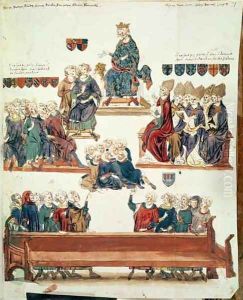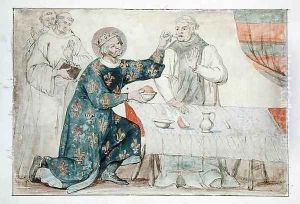Nicolas Claude Fabri de Peiresc Paintings
Nicolas Claude Fabri de Peiresc was a French astronomer, antiquary, and savant who lived during the late Renaissance and early Baroque periods. Born on December 1, 1580, in Belgentier, Provence, Peiresc was a pivotal figure in the intellectual landscape of early 17th-century Europe, known for his insatiable curiosity and extensive correspondence with scholars and scientists across the continent. His contributions spanned various fields, including astronomy, antiquities, and natural history, making him a polymath of his time.
Peiresc's education began at the University of Aix-en-Provence, where he studied humanities and law, a common curriculum for the nobility of his era. However, his interests quickly expanded beyond the legal sphere to encompass the broader horizons of science and antiquity. After completing his studies in Aix, Peiresc traveled extensively throughout Europe, including stops in Italy, where he was influenced by the vibrant scientific and artistic communities there. These experiences deepened his passion for learning and set the stage for his later contributions to various fields of knowledge.
Upon returning to France, Peiresc embarked on a career that was less about formal positions and more about the pursuit of knowledge for its own sake. He settled in Provence and surrounded himself with a vast collection of books, manuscripts, and antiquities, turning his home into a hub for scholars visiting from across Europe. Peiresc's work in astronomy is perhaps his most lasting legacy. He is credited with the discovery of the Orion Nebula in 1610, using a telescope at a time when the use of such instruments was still in its infancy. His observations contributed to the expanding knowledge of the cosmos following the revolutionary discoveries of Copernicus, Galileo, and Kepler.
Beyond his astronomical pursuits, Peiresc was deeply involved in the study of antiquities and natural history. He amassed a significant collection of coins, medals, and manuscripts, and he conducted archaeological excavations, which added to the understanding of ancient Mediterranean civilizations. His correspondence with scientists, artists, and scholars formed a vast network of intellectual exchange that prefigured the scientific societies of the later 17th century. Peiresc's letters, which were preserved and published posthumously, provide a wealth of information about the scientific and cultural milieu of his time.
Nicolas Claude Fabri de Peiresc died on June 24, 1637, in Aix-en-Provence. Though he held no major public office or academic position, his influence on the scientific and intellectual currents of his time was profound. Through his extensive network of correspondents, his generous support of other scholars, and his own research, Peiresc embodied the ideal of the Renaissance man, dedicated to the pursuit of knowledge across disciplines. His legacy is a reminder of the power of curiosity and intellectual exchange in driving the progress of science and culture.

